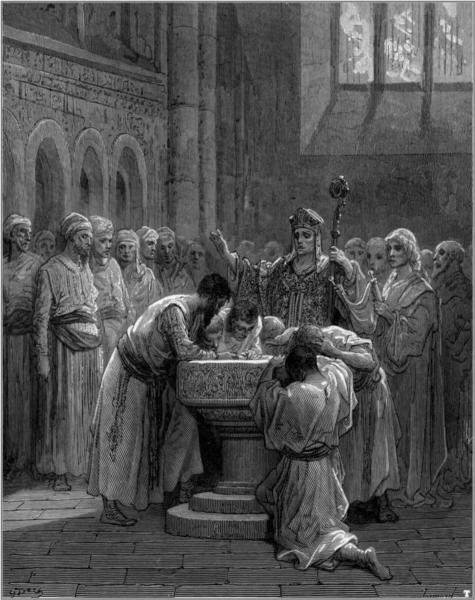
The Baptism of Infidels, by Gustave Dore (WikiPaintings).
[Part of a series on Baptism in Depth]
One of the clearest evidences to me of the existence of Sacred Tradition — of the idea that the Divine Revelation of Christ is not contained wholly and exclusively in Sacred Scripture, and that essential elements of Jesus’s teachings were not written down explicitly by the Apostles but continued to be passed down by their own oral teaching — is this: Despite only a few, arguably ambiguous statements from Jesus regarding Baptism in the canonical gospels — despite no recorded teaching of Christ stating clearly what Baptism is and how and why Christians should practice it — on the Day of Pentecost, upon the first proclamation of the Christian Gospel to the multitude, Peter knew just exactly what to do: “Repent, and be baptized, every one of you, in the name of Jesus Christ, for the forgiveness of your sins; and you shall receive the gift of the Holy Spirit” (Acts 2:38).

The Baptism of Cornelius (1709), by Francesco Trevisani (Wikipedia).
The conclusion that Peter knows something we don’t know is inescapable: He knows that (1) Baptism is an imperative that should be carried out immediately, now rather than later, upon believing in Christ; it is the answer to the question “what must be do?” to become a follower of Jesus; (2) Baptism in Jesus’s name is “for the forgiveness of your sins,” rather than merely “for repentance” as John the Baptist’s baptism was (cf. Matthew 3:11, Acts 19:4); (3) after Baptism, believers will receive the Holy Spirit. Not only does Peter seem to have a fuller understanding of what is happening in Baptism than the gospels indicate, but neither is a detailed explanation of this forthcoming in the remainder of the New Testament. The reader is left to infer Baptism’s meaning from context. In fact, the New Testament’s apparent lack of perspicuity on this matter is manifest enough that various Protestant sects proceeding from a basic reading of Scripture alone, shorn from Christian tradition, have come to widely differing and contradictory understandings of the doctrine — a doctrine of primary enough importance to the Gospel as to mentioned more than twice as often as “justification” (some 170 instances in 75 verses of “baptism” or “baptize”, as compared to only about 80 instances in 40 verses of “justification” or “justify”).
On the other hand, where Scripture is less than clear, Tradition, from the earliest times, evinces the same, full understanding of Baptism and its importance that the Apostles displayed in Scripture. There are no theological or exegetical debates or contradictory claims regarding Baptism found among the orthodox writers of the early Church. As a received doctrine, instructed and passed down by the Apostles themselves to their own disciples, and thence to each succeeding generation of Christians, the meaning and urgency of Baptism were completely understood:
Let us further inquire whether the Lord took any care to foreshadow the water [of baptism] and the cross. Concerning the water, indeed, it is written, in reference to the Israelites, that they will not receive that baptism which leads to the remission of sins, but will procure another for themselves. … [The words of another prophet] imply, Blessed are they who, placing their trust in the cross, have gone down into the water; for, says He, they shall receive their reward in due time. … Further, what says He? “And there was a river flowing on the right, and from it arose beautiful trees; and whosoever shall eat of them shall live for ever” (Ezekiel 47:12). This meaneth, that we indeed descend into the water full of sins and defilement, but come up, bearing fruit in our heart, having the fear [of God] and trust in Jesus in our spirit. “And whosoever shall eat of these shall live for ever.” This meaneth: Whosoever, He declares, shall hear thee speaking, and believe, shall live for ever. [Epistle of Barnabas XI (ca. A.D. 120)]
Then [the catechumens] are brought by us where there is water, and are regenerated in the same manner in which we were ourselves regenerated. For, in the name of God, the Father and Lord of the universe, and of our Saviour Jesus Christ, and of the Holy Spirit, they then receive the washing with water. For Christ also said, “Except ye be born again, ye shall not enter into the kingdom of heaven” (John 3:5). … And for this [rite] we have learned from the apostles this reason. …[In order that we] may become the children of choice and knowledge, and may obtain in the water the remission of sins formerly committed, there is pronounced over him who chooses to be born again, and has repented of his sins, the name of God the Father and Lord of the universe… [Justin Martyr, First Apology LX (ca. A.D. 155)]
On the fifth day the living creatures which proceed from the waters were produced, through which also is revealed the manifold wisdom of God in these things; for who could count their multitude and very various kinds? Moreover, the things proceeding from the waters were blessed by God, that this also might be a sign of men’s being destined to receive repentance and remission of sins, through the water and laver of regeneration,—as many as come to the truth, and are born again, and receive blessing from God. [Theophilus of Antioch, To Autolycus II.16 (ca. A.D. 170)]
Baptism, which is regeneration to God, was instituted by Jesus for the remission of sins. [Irenaeus of Lyon, Against Heresies I.21 (ca. A.D. 180)]
Giving to the disciples the power of regeneration into God, He said to them, “Go and teach all nations, baptizing them in the name of the Father, and of the Son, and of the Holy Ghost. [Irenaeus of Lyon, Against Heresies III.17 (ca. A.D. 180)]
The sins committed before faith are accordingly forgiven by the Lord, not that they may be undone, but as if they had not been done. … It ought to be known, then, that those who fall into sin after baptism are those who are subjected to discipline; for the deeds done before are remitted, and those done after are purged. [Clement of Alexandria, Stromata IV.24 (ca. A.D. 200)]
Happy is our sacrament of water, in that, by washing away the sins of our early blindness, we are set free and admitted into eternal life! [Tertullian, On Baptism I (ca. A.D. 200)]
From the very fact, that with so great simplicity, without pomp, without any considerable novelty of preparation, finally, without expense, a man is dipped in water, and amid the utterance of some few words, is sprinkled, and then rises again, not much (or not at all) the cleaner, the consequent attainment of eternity is esteemed the more incredible. … What then? Is it not wonderful, too, that death should be washed away by bathing? [Tertullian, On Baptism II (ca. A.D. 200)]

